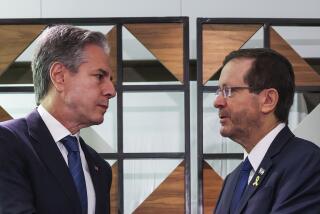Arabs Seek Unified Stand for 1-on-1 Talks : Mideast: Syria threatens to bolt sessions, charging Israel seeks to dictate procedures. But the Palestinians and Jordanians are ready to negotiate today.
MADRID — Arab delegations huddled in small groups Saturday to try to hammer out a common position on further talks with their Israeli adversaries, talks that were still in some doubt as the day ended.
Palestinian and Jordanian delegations had said earlier that they intended to meet today with the Israelis. But the Syrians, complaining that Israel is trying to dictate procedures, refused to commit themselves to attend. However, several well-informed Arab sources said they believe the Syrians will take part.
Secretary of State James A. Baker III telephoned Syrian Foreign Minister Farouk Shareh to renew the American call for active Syrian participation. Later, two of Baker’s top aides, Assistant Secretary of State Edward P. Djerejian and Dan Kurtzer, visited Shareh’s hotel suite.
Shareh was on the verge of making a surprise return to Damascus, but Saudi Arabia’s King Fahd and Egyptian President Hosni Mubarak got in touch with Shareh’s boss, President Hafez Assad, and persuaded him to keep the minister in Madrid. Fahd and Mubarak assured Assad that all the Arab delegations would oppose Israel’s bid to move the talks to the Middle East.
Despite all these last-minute appeals, rumors persisted that Syria might try to delay the opening of the bilateral talks for a few days.
In any event, Israeli officials said talks are scheduled to begin today at three locations in Madrid. The Israelis are to meet with the Palestinians and Jordanians in the Parsent Palace, with the Syrians in the Viana Palace and with the Lebanese in a public building called the National Institute for Industry. However, the Syrians reportedly were holding out for three meetings at one unspecified place at three different times.
The nagging difficulties of getting the pivotal face-to-face peace talks under way reflect the persistent reluctance of two key players and bitter rivals, Israel and Syria, to enter unstructured talks.
Both countries were approaching the talks with absolutely no common view of what they were to negotiate about.
Israel insists that it will never surrender the Golan Heights, which it captured from Syria in 1967, while Syria came to Madrid determined to talk about nothing but regaining the strategic mountain ridge. Syria refuses to commit itself to signing a peace treaty with Israel, which is precisely the goal of Israel’s participation.
Before even getting to anything of substance, the two sides are going head-to-head over a relatively minor and mostly symbolic issue of where their talks should be held. Syria wants the talks to stay in Madrid, Israel prefers the Middle East.
The Israelis, at least, expect that this obstruction will be only the first of many such bumps in the road. “There will be a tug-of-war at every step,” said Yossi Olmert, the Israeli government spokesman.
By contrast, Israel and the Palestinians appeared to be headed toward a quick dive into the icy waters of diplomatic give-and-take. The Palestinians agreed to attend today’s talks without much resistance. So did Jordan, with whom the Palestinians share a joint delegation.
The relaxed acceptance drew praise from the usually skeptical Israelis. “The Palestinians showed their eagerness to get some kind of talks going,” said Olmert. He attributed the Jordanian attitude to a desire to please Washington.
Israel and the Palestinians have already agreed on what they are going to talk about: self-rule for Palestinians and eventual talks on the “final status” of the occupied West Bank and Gaza Strip.
Lebanon, which is strongly influenced by the Syrians, also showed reluctance to attend today’s meetings. Moreover, the Lebanese delegation was preoccupied by Israeli bombing and shelling of villages in south Lebanon. According to reports from the area, Israeli jets dropped leaflets on dozens of communities warning residents to flee. Thousands of civilians were reported heading north.
Israeli officials denied calling on Lebanese to leave their homes. “Nonsense,” said Deputy Foreign Minister Benjamin Netanyahu.
The Lebanese foreign minister and chief delegate, Faris Bouez, appealed to Djerejian to use American influence to stop the Israelis from attacking. U.S. officials declined to say if Washington planned to take action.
Both Syria and Lebanon hinted that the attacks might cause them to pull out of the peace process entirely.
A Syrian statement said Israel’s “beastly aggression is tangible proof of the Israeli government’s misconception of peace.”
Throughout his eight-month drive to bring Israel and its Arab adversaries to the bargaining table, Baker expressed his confidence that once the delegates meet face-to-face they will begin to resolve the region’s festering controversies in their own way. For this reason, the secretary of state avoided getting too specific for fear of alienating one of the parties.
Syria wants to avoid any action that might be construed as recognition of Israel until it has received some sort of assurance that it will regain the Golan Heights. Syrian officials were displeased that Baker called for negotiations on the basis of U.N. Resolutions 242 and 338 rather than demanding implementation of the resolutions at the outset. The resolutions call on Israel to withdraw its forces from occupied territory, but the Israelis maintain that they have already fulfilled that directive by returning to Egypt the Sinai Peninsula, constituting the bulk of the land Israel seized in 1967.
The Syrians also wanted to talk peace in an international setting while the Israelis demanded direct face-to-face negotiations. According to an Arab diplomat, the Syrians were badly disappointed by the Madrid conference. The diplomat said Syria had expected the conference to last longer than it did and flow directly into the bilateral talks, providing the “international” cover that Damascus has long sought.
Moreover, Syrian officials are clearly uncomfortable with the prospect of talking directly to Israeli Jews, the objects of decades of hostility. During a tumultuous Friday press conference in Madrid, Shareh, usually a suave diplomat, refused at first to take questions from Israeli reporters and when he did, the Israelis accused him of being evasive.
For its part, Israel wants guarantees that Syria will sign a formal peace treaty at the end of the negotiations. The Syrians have not indicated they will do that. In his speech Wednesday to the opening session of the conference, President Bush called for treaties, not just a state of nonbelligerency. The Israelis were pleased with that, but it was not enough to make them want to plunge into substantive talks with Syria.
One factor that is clearly on the minds of both Arabs and Israelis is Israel’s request for $10 billion in loan guarantees to house the influx of Soviet Jewish immigrants. At Bush’s urging, Congress agreed to put off any discussion of the request until early next year. The President said the delay would prevent the issue from interfering with the delicate Middle East peace talks.
But there is no way to insulate the talks from the loans. If the Administration insists that in return for the guarantees, Israel must freeze settlement activity in the West Bank and Gaza Strip, as some senior officials have suggested that it might, this would give the Arabs what they want most. If the Administration makes no such demand, it would be a major victory for Israel. Either way, it seems pointless to negotiate about something that U.S. action might change radically.
“I don’t think much will happen until Bush and (Israeli Prime Minister Yitzhak) Shamir have resolved the debate over settlements,” William B. Quandt, a former U.S. National Security Council expert on the Middle East, said recently. “I don’t think the Arabs will put their cards on the table until they know the role the United States will play. The loan guarantees will be a test case.”
The dispute over the venue of the talks, as childish as it might seem to the outside world, is an effective way to slow down the process. Israel has said that at this stage it is willing to discuss only the location of future talks. Israeli officials say they want the substantive talks to be held in the Middle East, preferably alternating between Jerusalem and Arab capitals as a display of Arab recognition of Israel’s right to exist as a state.
“The Middle East is the natural place,” said Netanyahu.
Times staff writer Kim Murphy contributed to this report.
More to Read
Sign up for Essential California
The most important California stories and recommendations in your inbox every morning.
You may occasionally receive promotional content from the Los Angeles Times.









